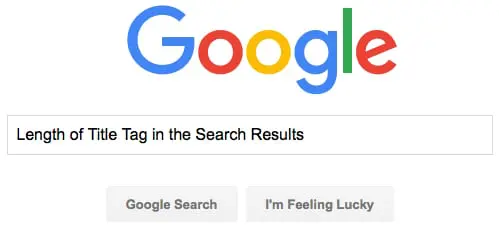GOOGLE INCREASES LENGTH OF TITLE TAGS: WHAT NOW?

This past week, it was widely reported that Google made changes to their search results pages. One of the changes that they made was to increase the width of the main search results column. Then, since the width of the main search results column received an additional 100 pixels, there was room for Google to increase the length of title tags. Now, more of your title tag will show in the search results. The length of Title Tags has increased in the search results. Or, another way to look at it is that more keywords will show in the search results. But before you go out and update all of your title tags, you need to consider a few things.
- The length of Title Tags in Google’s search results has increased to 70–71 characters, which is up from its previous 50–60 characters.
- Just because a keyword in your title tag doesn’t show in the search results doesn’t mean that Google isn’t considering it as a part of their algorithmic review of your page.
- Well written title tags are still important.
- A good excuse to review your title tags on all pages.
- Google still may rewrite your title tag depending on the search query.
The length of Title Tags in Google’s search results has increased to 70–71 characters, which is up from its previous 50–60 characters.
Since Google increased the size of the search results column from 500 pixels to 600 pixels, they had more room for our title tags in the search results. I suspect that this increase is most likely due to the fact that more of us are using larger screens for our desktops. I use at least a 27 inch screen on my desk, and in my home office I use a 42 inch screen. On a laptop, even if it is a 15 inch laptop, the screen resolutions have gotten much better, so it’s logical that Google would make this change.
Just because a keyword in your title tag doesn’t show in the search results doesn’t mean that Google isn’t considering it as a part of their algorithmic review of your page.
If you have a title tag that is longer than what is being shown in the Google search results, Google still may use keywords that you put in your title tag. For example, if you have a blog post with a long title, there may be words in there that are relevant even though Google isn’t showing those words in the search result. In an ideal situation, though, shorter titles are better, you generally don’t want a long title that’s in the form of a sentence. Unfortunately, I still see people write title tags as if they’re a place to write a sentence. We need to think of Title Tags as if they’re a headline–and something that the Google user sees in the search results. That title tag should encourage someone to click on through to your website.
Well-written title tags are still important.
Don’t underestimate the power of a great title tag. As I mentioned before, the Title Tag should encourage someone to click on through to your website. Don’t just stuff keywords into the Title Tag because you think they will help your site rank better. Just yesterday I reviewed Title Tags on a website and the site owner had stuffed their main website’s keyword (the one keyword they want to rank for) into all Title Tags on every single page. That’s excessive and is just plain outright search engine spam.
A good excuse to review your title tags on all pages.
Google’s update of the length of Title Tags is a good time to review all of the title tags on your website. I would use something like Screaming Frog’s SEO Spider to crawl your site and review your Title Tags.
Other alternatives: review the HTML suggestions in Google Search Console. You can also use the site:yourdomain.com search query at Google to look at all of the pages they have indexed. Review all of the title tags as they appear in the search results. You may see some that need to be updated and ones that are just too long. But I would, though, crawl your own site and review the Title Tags, as there can be pages with duplicate Title Tags that Google is not indexing.
Google still may rewrite your title tag depending on the search query.
Keep in mind that at the end of the day, Google may still feel the need to rewrite your page’s Title Tag no matter how you write it. Their algorithm will decide when and for which search queries they will rewrite your Title Tag if they think you’ll get more clicks on your search result. I once saw Google rewrite every single Title Tag on a website–I simply saw what Google liked and what they didn’t, and rewrote all of the Title Tags on every page based on what Google was telling me it should be. That’s an extreme case, but if you notice that your Title Tags are being rewritten, you may want to rewrite it.
Sure, Google has given us more room for adding more keywords or words in our Title Tags. But that absolutely doesn’t mean that we need to rush out and rewrite our Title Tags. Quite the contrary. If you’ve optimized the website and you’ve done what you need to do to write great Title Tags, then this is just another change by Google. If you have good Title Tags, you don’t need to do anything.



















